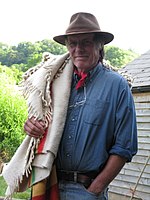Patrick Whitefield, Date of Birth, Place of Birth, Date of Death
TweetPatrick Whitefield
English horticulturist
 Date of Birth: 21-May-1965
Date of Birth: 21-May-1965
 Place of Birth: Devizes, England, United Kingdom
Place of Birth: Devizes, England, United Kingdom
Date of Death: 27-Feb-2015
Profession: farmer, horticulturist, ecologist
Nationality: United Kingdom
Zodiac Sign: Gemini 
About Patrick Whitefield
- Patrick Whitefield (born Patrick R.
- Vickers, 11 February 1949 – 27 February 2015) was a British permaculture teacher, designer, author, and consulting editor for Permaculture Magazine.
- He was regarded as one of the leading and pioneering permaculture authorities in Europe.He was born Patrick Vickers, in Devizes, Wiltshire, and grew up on a smallholding in Somerset before studying agriculture at Shuttleworth College in Bedfordshire.
- After several years working in agriculture in the Middle East and Africa, he returned to Somerset and bought a flower-rich hay meadow, the White Field near Butleigh, to maintain it as a nature reserve.
- Thereafter he took his name from the field, which, after 25 years, he transferred to the care of the Somerset Wildlife Trust.As well as producing vegetables, Whitefield undertook a variety of traditional country crafts, and for a period was a prominent member of the Ecology Party (forerunner of the Green Party of England and Wales) and was involved in the early years of the Glastonbury music festival.
- He was an influential British exponent of the permaculture system from 1990, developing his own approach.
- He was interviewed in several television programmes advocating permaculture, including the BBC's It's Not Easy Being Green (2006) and A Farm for the Future (2008).He was the author of Tipi Living (1987), Permaculture in a Nutshell (1993), How to Make a Forest Garden (1996), The Earth Care Manual (2004), and The Living Landscape, How to Read it and Understand it (2010).
- The Minimalist Gardener (2017) was posthumously published.
- He taught on various courses in England, including at Ragmans Lane Farm in Gloucestershire and created the first online permaculture design course in Britain.
- He also worked as a permaculture design consultant, and set up Patrick Whitefield Associates to pass on his skills and experience to a new generation of teachers.He died at his home in Glastonbury, Somerset, on 27 February 2015, aged 66.
Read more at Wikipedia
See Also
- Famous People's Birthdays on 21 May, United Kingdom
- Famous People's Birthdays in May, United Kingdom
- Famous farmer's Birthdays on 21 May, United Kingdom
- Famous farmer's Birthdays in May, United Kingdom
- Famous horticulturist's Birthdays on 21 May, United Kingdom
- Famous horticulturist's Birthdays in May, United Kingdom
- Famous ecologist's Birthdays on 21 May, United Kingdom
- Famous ecologist's Birthdays in May, United Kingdom

